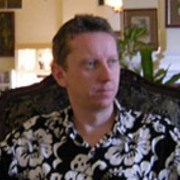
Bryan Shaw
Bryan Shaw's interest in working in television was sparked partly by his late father Barry Shaw, a longtime writer about television for The NZ Herald.
In 1984 Shaw applied for a job at Northern Television and began working in the tape room, where each morning boss Graeme Douglas would ask him if he knew what he was doing. If Shaw said yes, the reply was usually "pig's arse"; if Shaw admitted he had no idea, he was told to carry on.
At Northern, Shaw learned the ropes from people like cameraman John Cavill and editor Hamish Hill. He also met Neil Roberts, hiding in a car with him the first morning they met, after the abrupt cancellation of TV show Good Morning New Zealand. Roberts promised him a job, and after starting production company Communicado, was true to his word. Shaw edited on a wide range of Communicado shows, but found himself drawn to long form and documentary. He also met filmmaking team John and Karen Bates, who he regards as "among the best documentary makers in the country".
Shaw would go on to edit many documentaries for Bates, including documentaries on Scottish migrants to New Zealand, censorship (Banned), and painter Gretchen Albrecht. Two of his favourite projects were directed by Bates: 1993 documentary Sense of Place, and waterfront strike doco 1951. The latter title included an interview with Shaw's father, who was a cub reporter during the strikes.
Sense of Place, the first film to screen in TV One's Work of Art slot, was a portrait of photographer Robin Morrison. Shaw enjoyed getting to edit images by Piano cinematographer Stuart Dryburgh. "Of all the docos I've made I'd have to say that's still my favourite. I think it's just a combination of a really good director, Robin being really articulate, the fact it was shot on film, and the music...all of those things came together."
Award-winning Rose Noelle documentary Back from the Dead proved another enjoyable cutting job, with its central challenge of buidling a story around four men trapped for months in the cabin of an upturned trimiran.
Having gone freelance after being given a contract by Richard Driver, Shaw was keen to edit drama. Finally, after a dinner meeting with producer Chris Hampson during which a man flashed them through a restaurant window, Shaw was hired to cut episodes of crime/law series Street Legal. Much of the footage for the long-running show was shot on the streets of Auckland.
By 2003 Shaw was being nominated for his work both editing drama (Street Legal) and documentary. He won the non-drama award that year for What if New Zealand Becomes a State of Australia? Shaw was also keeping busy on a run of Screenworks dramas, including kidult series Hard Out and Skin & Bone, Greg McGee's TV reinterpretation of his classic play Foreskin's Lament.
Shaw's work on Screenworks drama Doves of War would beat out episodes of The Insiders Guide to Love to take out a 2006 Qantas editing award. He also edited episodes of Spartacus and two TV-movies shot in NZ with North American audiences in mind: Exposure and No One Can Hear You.
Shaw, who hails from West Auckland, was excited to work on Westie success Outrageous Fortune, and in 2005 was invited to cut episodes of the second season, and later, prequel show Westside (including this first episode). e would go on to win Qantas Awards for his Outrageous work for two years running, plus a nomination in 2009. Two years later Shaw was nominated for an Aotearoa Award for The Almighty Johnsons, and edited episodes of Step Dave and the effects-heavy Spartacus. He has also dipped his toes in horror with the Rob Tapert produced remake of cult classic The Evil Dead, plus spin-off show Ash vs Evil Dead.
Shaw has kept his hand in documentary, after lucking out again with a project which combined his passion for motorcycles and super 8mm film: the multi award-winning Love Speed and Loss, about late motorcycling champion Kim Newcombe. Shaw's work on the documentary won him an award at the 2007 Air NZ Screen Awards (Later, he was part of the editing trio on 2018 car racing doco Born Racer. )
Around the same time Shaw teamed up with Back of the Y co-creator Matt Heath to edit madcap feature The Devil Dared Me To. Shaw has gone on to edit a run of based on a true story DT dramas for director/producer Riccardo Pellizzeri, among them Rainbow Warrior TV movie Bombshell and miniseries Dear Murderer (about high profile lawyer Mike Bungay).
Profile updated on 16 July 2020
Sources include
Bryan Shaw
'Bryan Shaw: On the responsibilities and challenges of editing...' (Video Interview) NZ On Screen website. Director Andrew Whiteside. Loaded 15 March 2016. Accessed 16 March 2016